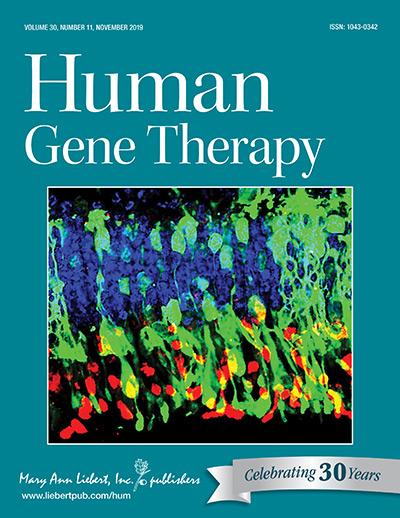
Credit: Mary Ann Liebert, Inc., publishers
New Rochelle, NY, November 12, 2019–A new study has shown that a commonly used vector for large gene transfer can successfully deliver genes to retinal cells in the laboratory, but when injected subretinally into rats it provokes a robust and acute inflammatory response. A detailed description of this study and the implications of its results are published in Human Gene Therapy, a peer-reviewed journal from Mary Ann Liebert, Inc., publishers. Click here to read the full-text article free on the Human Gene Therapy website through December 12, 2019.
Luke Wiley and colleagues from University of Iowa, Iowa City, coauthored the article entitled “Helper-Dependent Adenovirus Tranduces the Human and Rat Retina but Elicits an Inflammatory Reaction When Delivered Subretinally in Rats.” Many of the genes that cause inherited retinal degeneration are too large to deliver using more conventional approaches, such as adeno-associated viruses. The researchers showed that the vector known as helper-dependent adenovirus serotype 5 (HDAd5) was able to deliver genetic material to rod and cone photoreceptors in human retinal organ cultures. However, when they used the same vector for gene delivery to a live rat model, they reported a strong immune reaction. The researchers conclude that further work is needed to understand the inflammatory pathways involved and to identify ways to modulate the immune response to enable safe delivery of large genes to the retina using HDAd5.
“The work by Dr. Wiley and his group at the University of Iowa opens up the possibility of gene therapy for genetic retinal disease patients whose defects are in genes that are too large to fit into adeno-associated virus (AAV) particles,” says Editor-in-Chief Terence R. Flotte, MD, Celia and Isaac Haidak Professor of Medical Education and Dean, Provost, and Executive Deputy Chancellor, University of Massachusetts Medical School, Worcester, MA.
###
About the Journal
Human Gene Therapy, the Official Journal of the European Society of Gene and Cell Therapy and either other international gene therapy societies, was the first peer-reviewed journal in the field and provides all-inclusive access to the critical pillars of human gene therapy–research, methods, and clinical applications. The Journal is led by Editor-in-Chief Terence R. Flotte, MD, Celia and Isaac Haidak Professor of Medical Education and Dean, Provost, and Executive Deputy Chancellor, University of Massachusetts Med-ical School, and an esteemed international editorial board. Human Gene Therapy is available in print and online. A table of contents and a free sample issue may be viewed on the Human Gene Therapy website.
About the Publisher
Mary Ann Liebert, Inc., publishers is a privately held, fully integrated media company known for establishing authoritative peer-reviewed journals in many promising areas of science and biomedical research, including Nucleic Acid Therapeutics, Tissue Engineering, Stem Cells and Development, and Cellular Reprogramming. Its biotechnology trade magazine, GEN (Genetic Engineering & Biotechnology News), was the first in its field and is today the industry’s most widely read publication worldwide. A complete list of the firm’s 80 journals, books, and newsmagazines is available on the Mary Ann Liebert, Inc., publishers website.
Media Contact
Kathryn Ryan
[email protected]
914-740-2250
Related Journal Article
http://dx.




